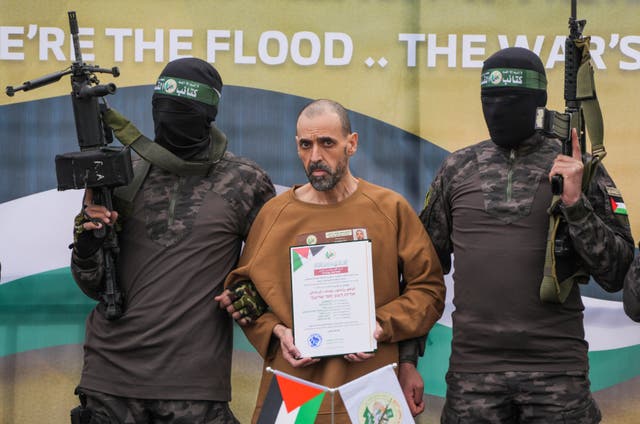Daughter of one of the oldest Gaza hostages calls for all kidnapped to be freed
Dr Sharone Lifschitz, 53, of Walthamstow, east London, says the gradual releases by Hamas are like ‘a reality show from hell’.

The British-based daughter of one of the oldest Gaza hostages has called the gradual release of prisoners “a reality show from hell”.
Dr Sharone Lifschitz, 53, said it is crucial that all hostages held in Gaza are freed and warned that lives are still at risk.
Dr Lifschitz, of Walthamstow, east London, says she still has hope her father Oded Lifshitz, who was taken from Kibbutz Nir Oz during the Hamas October 7 2023 attack, is alive but she is “realistic” about his “slim” chances.
Her 84-year-old father, who is a retired Israeli journalist, a great-grandfather and a grandfather of 11, is one of the UK-linked hostages that have not been freed.
Her “formidable force” of a mother Yocheved, 86, was also taken hostage but was released two weeks later. She now campaigns for the hostages to be released.
Dr Lifschitz says she was “not surprised” by the gaunt and frail state of the three Israeli hostages, including UK-linked Eli Sharabi, who were freed by Hamas-led militants on Saturday.
It adds to her fears for the other captives and, like their families, she has to brace herself for the weekly hostage release lists, which bring both joy and pain.

She told the PA news agency: “My father was already skinny when he left. He left in much worse health than Eli, and therefore every week, we have no reason to believe he might not have survived.
“Obviously seeing their (the released hostages) condition does not make us feel confident about his safe return to us.
“In the length of time over which (the releases) unfold, we build expectation and they’re being dashed every week.
“The enormous fear for my father’s wellbeing, for the wellbeing of everyone, it doesn’t diminish, it intensifies and I think now it’s very clear that they must all come back.
“This deal over weeks and weeks does not serve the hostages. It does not improve their safety. It is a very dangerous situation to put people in very bad condition.”

Her father had been shot in the hand but was alive in November 2023, according to information given to her family by a released hostage who had seen him when they were held.
Dr Lifschitz says she wants to focus on more hostages being freed and for her family “to be able to close their circle”.
She said: “If we just carry on in a wave of emotion, we will not get more home and we will go to more funerals than reunions.”
“The priority at the moment, for me is that the live ones, those who are suffering, can come back home. Their families suffer tremendously, but the dead are not suffering. The suffering of the living is what should guide us at this point.”
Israel freed nearly 200 Palestinian prisoners on Saturday, in the latest exchange of a ceasefire agreement that has paused 16 months of war in Gaza.

The hostages’ condition and scenes of Hamas forcing them to speak in a handover ceremony sparked outrage in Israel and could increase pressure on Prime Minister Benjamin Netanyahu to extend the ceasefire beyond its current six-week phase.
Prime Minister Keir Starmer said he was relieved that Mr Sharabi was freed but was “dismayed to see his frail condition and the circumstances of his release”.
Dr Lifschitz, who is a filmmaker and academic, said: “We must not, at this point, be spending all our energy on the weekly reality show that is from hell.”
She added: “If we don’t stay absolutely focused on the return of all of them, this deal to return them will break as well.
“The life of real human beings are at stake here and they are human beings that have already paid a huge price. They have been in captivity for over 490 days, many of them have other members of family that were killed or communities that were destroyed.”
On Saturday in front of a crowd of hundreds, armed militants led Mr Sharabi, 52; Ohad Ben Ami, 56; and Or Levy, 34, onto a stage to make statements before handing them over to the Red Cross, which said it was “increasingly concerned about the conditions surrounding release operations”.
It urged all parties to ensure releases are dignified and private.
The three civilian men were among 250 people taken during the Hamas-led attack on Israel on October 7 2023, which sparked the war.
Mr Sharabi was taken captive from Kibbutz Beeri and his Bristol-born wife Lianne and teenage daughters Noiya and Yahel were killed by militants while hiding in their safe room.
His brother Yossi Sharabi was killed in captivity.
Lianne’s parents Gill and Pete Brisley told the BBC On Sunday that an Israeli Defence Forces (IDF) soldier told Mr Sharabi what had happened to his family.
Later on Saturday, Israel released 183 Palestinian prisoners, some also appearing gaunt and weak.
Hamas’ military wing, the Qassam Brigades, said it had made efforts to preserve the hostages’ lives “despite the (Israeli) bombardment”.
The ceasefire’s first phase calls for the release of 33 hostages and nearly 2,000 Palestinian prisoners, the return of Palestinians to northern Gaza and an increase in humanitarian aid to the devastated territory.
Dr Lifschitz said: “What has happened to my father is really unfair. He led a life of commitment. He drove Palestinians to hospital two weeks before he was taken hostage and was a volunteer in the Road to Recovery programme.
“He really believed that we can be better than our base most hateful instinct. I think the fact he has had to experience this at such a late stage of his life when his health was not so strong is very painful.”





